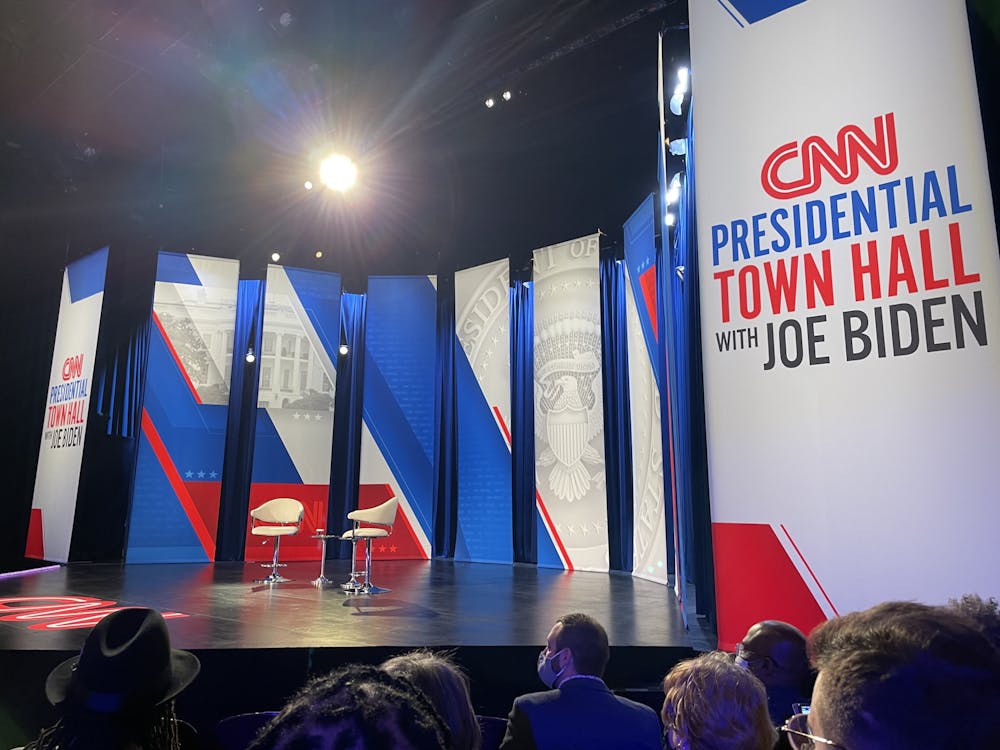President Joe Biden answered questions delivered by CNN anchor Anderson Cooper at a CNN town hall meeting in Baltimore on Oct. 21. The event took place at Baltimore Center Stage in Mount Vernon.
Many Baltimore residents attended the event and asked Biden questions regarding child care, climate change, gas prices and supply chain management. The event was invitation-only. Students and faculty from several universities in Baltimore attended, including Hopkins, Morgan State University and Loyola University.
Biden spoke about his plans for the care economy and infrastructure and discussed how these agendas will be funded, claiming taxes will not be raised. At the event, Biden noted that he proposed free child care for households making under $300,000 a year and training more home health-care workers for the elderly under his economic plan.
"We have two plans. One is the infrastructure plans, roads, highways, bridges, buses, trains, et cetera, and the other one is what I call the care economy. It has a lot of money in there for environmental remediation, as well as care economy,” he said. “And by the way, all of it is paid for — every single penny.”
Biden also discussed the education initiatives that are part of his agenda. Though free community college will likely be removed from Biden’s economic plan, he has suggested raising Pell grants to offset this cut.
Though not included in the current economic plan, Biden promised free community college in upcoming years.
“But I promise you, I guarantee you, we’re going to get free community college in the next several years and across the board,” he said.
Members of the University’s Student Government Association were invited to the event. Sophomore Class President Kobi Khong asked Biden a question about climate change.
“The reason I asked a question about climate change is because it is such an enormous problem on a global scale that is given such little attention,” he said. “That's terrifying and an issue that should not be partisan since no matter what party you support, these issues will affect you — but the politicians we see in government treat it as an afterthought because they won't have to live in the world that they are currently letting be destroyed.”
In response, Biden spoke of rejoining the Paris Accord and getting to net-zero emissions by 2050.
Khong commented to The News-Letter that he was disappointed Biden did not take a more dynamic approach.
“Although I wish he would have taken a harder, more progressive stance, I understand the position he's in to court support from the more moderate Democrats like Joe Manchin,” he said.
Another Hopkins attendee, sophomore Amrita Mukunda, believed that Biden could have answered questions more clearly.
“On TV the way they pan the camera and focus on Biden makes his words feel more focused, but during the event, it kind of felt like he was half answering the question or answering something else entirely,” she said. “If Anderson Cooper didn’t keep pushing Biden to answer the asked questions, I don’t think he would have. And even when pushed, his answers weren’t great.”
Junior Shivanie Ally, who watched the event on television, was also dissatisfied with Biden’s responses.
“He honestly seemed like he was beating around the bush. It seemed like he knew the problems existed but did not have the solutions for them,” Ally said. “A lot of things he campaigned for seem to go out the window in his new plans. Politicians should have concrete plans, but Biden’s answers didn’t seem to. Even if he has plans, he needs to articulate them.”
Junior Class Senator Chinat Yu shook hands and briefly spoke with the president.
“I commanded his attention and shook his hand for three seconds,” he said. “That was a million-dollar handshake right there — it was life-changing.”





